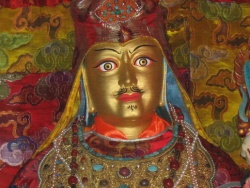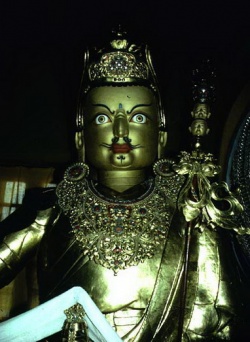The Guru Disciple Relationship Advice by HH the Dalai Lama
Q: What do you think about Dharma teachers who speak and write about Dharma beautifully, but do not live it?
A: Because Buddha knew of this potential consequence, he was very strict in prescribing the qualities that are necessary for a person to be qualified as a teacher. Nowadays, it seems, this is a serious issue. First on the teacher’s side: the person who gives some teaching, or gives talks on Dharma must have really trained, learned, and studied. Then, since the subject is not history or literature, but rather a spiritual one, the teacher must gain some experience. Then when that person
talks about a religious subject with some experience, it carries some weight. Otherwise, it is not so effective. Therefore, the person who begins to talk to others about the Dharma must realize the responsibility, must be prepared. That is very important. Because of this importance, Lama Tsongkhapa, when he describes the qualifications that are necessary for an individual to become a teacher, quotes from Maitreya’s Ornament of Scriptures, in which Maitreya lists most of the
key qualifications that are necessary on the part of the teacher, such as that the teacher must be disciplined, at peace with himself, compassionate, and so on. At the conclusion, Lama Tsongkhapa sums up by stating that those who wish to seek a spiritual teacher must first of all be aware of what the qualifications are that one should look for in a teacher. Then, with
that knowledge, seek a teacher. Similarly, those who wish to seek students and become teachers must not only be aware of these conditions, but also judge themselves to see whether they possess these qualities, and if not, work towards possessing them. Therefore, from the teachers’ side, they also must realize the great responsibility involved. If some
individual, deep down, is really seeking money, then I think it is much better to seek money through other means. So if the deep intention is a different purpose, I think this is very unfortunate. Such an act is actually giving proof to the Communist accusation that religion is an instrument for exploitation. This is very sad.
Buddha himself was aware of this potential for abuse. He therefore categorically stated that one should not live a way of life which is acquired through five wrong means of livelihood. One of them is being deceptive and flattering toward one’s benefactor in order to get maximal benefit.
Now, on the students’ side, they also have responsibility. First, you should not accept the teacher blindly. This is very important. You see, you can learn Dharma from someone you accept not necessarily as a guru, but rather as a spiritual friend. Consider that person until you know him or her very well, until you gain full confidence and can say, “Now, he or she can be my guru.” Until that confidence develops, treat that person as a spiritual friend. Then study and learn from him or her. You also can learn through books, and as time goes by, there are more books available. So I think this is better.
Here I would like to mention a point which I raised as early as thirty years ago about a particular aspect of the guru-disciple relationship. As we have seen with Shantideva’s text Guide to the Bodhisatva’s Way of Life, we find that in a particular context certain lines of thought are very much emphasized, and unless you see the argument in its proper context there is a great potential for misunderstanding. Similarly, in the guru-disciple relationship, because your guru plays such an important role in serving as
the source of inspiration, blessing, transmission, and so on, tremendous emphasis is placed on maintaining proper reliance upon and a proper relationship with one’s guru. In the texts describing these practices we find a particular expression, which is, “May I be able to develop respect for the guru, devotion to the guru, which would allow me to see his or her every action as pure.”
I stated as early as thirty years ago that this is a dangerous concept. There is a tremendous potential for abuse in this idea of trying to see all the behaviours of the guru as pure, of seeing everything the guru does as enlightened. I have stated that this is like a poison. To some Tibetans, that sentence may seem a little bit extreme. However, it seems now, as
time goes by, that my warning has become something quite relevant. Anyway, that is my own conviction and attitude, but I base the observation that this is a potentially poisonous idea on Buddha’s own words. For instance, in the Vinaya teachings, which are the scriptures that outline Buddha’s ethics and monastic discipline, where a relationship toward one’s guru is very important, Buddha states that although you will have to accord respect to your guru, if the guru happens to give you instructions which contradict the Dharma, then you must reject them.
There are also very explicit statements in the sutras, in which Buddha states that any instructions given by the guru that accord with the general Dharma path should be followed, and any instructions given by the guru that do not accord with the general approach of the Dharma should be discarded.
It is in the practice of Highest Yoga Tantra of Vajrayana Buddhism where the guru-disciple relationship assumes great importance. For instance, in Highest Yoga Tantra we have practices like guru yoga, a whole yoga dedicated toward one’s relation to the guru. However, even in Highest Yoga Tantra we find statements which tell us that any instructions given by the guru which do not
accord with Dharma cannot be followed. You should explain to the guru the reasons why you can’t comply with them, but you should not follow the instructions just because the guru said so. What we find here is that we are not instructed to say, “Okay, whatever you say, I will do it,” but rather we are instructed to use our intelligence and judgment and reject instructions which are not in accord with Dharma.
However we do find, if we read the history of Buddhism, that there were examples of single-pointed guru devotion by masters such as Tilopa, Naropa, Marpa, and Milarepa which may seem a little extreme. But we find that while these masters, on the surface, may look like outcasts or beggars, or they may have strange behaviours which sometimes lead other people to lose faith,
nevertheless when the necessity came for them to reinforce other people’s faith in the Dharma and in themselves as spiritual teachers, these masters had a counterbalancing factor – a very high level of spiritual realization. This was so much so that they could display supernatural powers to outweigh whatever excesses people may have found in them, conventionally
speaking. However, in the case of some of the modern-day teachers, they have all the excesses in their unethical behaviours but are lacking in this counterbalancing factor, which is the capacity to display supernatural powers. Because of this, it can lead to a lot of problems.
Therefore, as students, you should first watch and investigate thoroughly. Do not consider someone as a teacher or guru until you have certain confidence in the person’s integrity. This is very important. Then, second, even after that, if some unhealthy things happen, you have the liberty to reject them. Students should make sure that they don’t spoil the guru. This is very important.


